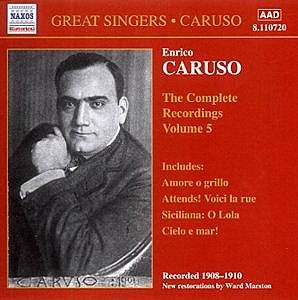The tenor made the gramophone, and the gramophone made
the tenor. No, not Pavarotti, but this tenor, Enrico Caruso. Born in
Naples he made his debut in his native city in 1894. He arrived at Covent
Garden in 1902 and at the ‘Met’ a year later and where he sang every
season until 1920 making over 600 appearances in 36 roles. His career
ended prematurely on Christmas Eve 1920 when he was singing Eleazer
from ‘La Juive’ whilst suffering from plural pain, which developed into
acute bronchial pneumonia.
Equally at home in bel canto and, to him, contemporary
verismo, Caruso’s voice was full-toned, mellifluous and mellow. Even
in his younger days his voice had baritonal overtones. In the 1908-09
season he suffered something of a vocal crisis and on recovery his voice
was distinctly darker. These recordings, all listed as being made in
1910, are therefore particularly interesting for being some of the earliest
he made post that change. (The sleeve front gives 1908-1910 and contradicts
the individual matrix numbers and dates!).
Whilst Caruso dominated the ‘Met’ roster, the theatre
also featured all the great singers of the day and several of them grace
this disc alongside the great tenor. The disc starts with nine tracks
from Faust. Here the tenor’s lovely phrasing and honeyed head voice
is matched by the powerful and characterful Mephisto of Marcel Journet,
and Geraldine Farrar’s flexible soprano as Marguerite. The love duet
(tr 5) and the final trio (tr 9) are particularly fine. Those interested
in direct comparisons with our present and recent generation of tenors
should focus on Caruso’s rendition of Ponchielli’s ‘Cielo e mar’ (tr
14) from La Gioconda. Personally, I prefer Bergonzi’s rendition in the
complete recording of the opera (Decca). But of course style changes
with time, and as the sleeve note points out the two Il Trovatore extracts
exhibit a distinctly different style than we find on contemporary recordings
or in the theatre (tr 19-20). In these two extracts Caruso is joined
by the even toned Louise Homer, more contralto in timbre than many interpreters
she is a fine Azucena to his heroic Manrico. She is also equally at
home as Amneris to Caruso’s elegantly phrased and characterized Radames
in the Aida extracts (tr 22-23).
The re-mastering is very good, as we have come to expect
from Ward Marston. Surface noise, although present, is not intrusive.
For those interested in singing, and particularly how Caruso’s voice
changed after 1909, this disc will be an essential purchase and will,
I suggest, provide much pleasure.
Robert J Farr

